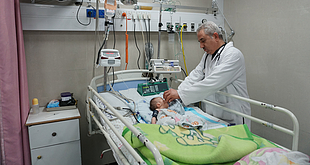UN: Electricity crisis brings Gaza to verge of disaster
Funding is desperately needed for emergency fuel
 Emergency fuel for critical facilities in Gaza will become exhausted within the next ten days, the United Nations warned today, noting an urgent need for donor support to avoid a humanitarian catastrophe driven by the energy crisis.
Emergency fuel for critical facilities in Gaza will become exhausted within the next ten days, the United Nations warned today, noting an urgent need for donor support to avoid a humanitarian catastrophe driven by the energy crisis.
Supported by donors, the UN coordinates the delivery of emergency fuel to run back-up generators and vehicles in order to ensure that a minimum level of life-saving health, water and sanitation services are maintained in the midst of the dire electricity shortage facing the blockaded Strip. At present, the nearly two million Palestinian residents of Gaza, over half of whom are children, receive electricity for no more than eight hours each day.
In 2018, US$6.5 million is required to provide 7.7 million litres of emergency fuel. This is the bare minimum needed to stave off a collapse of services; for the full functioning of critical facilities, the need is 1.4 million litres per month, or about $10 million per year. Currently at risk are emergency and diagnostic services, like MRIs, CT and x-rays, intensive care units and operating theatres in 13 public hospitals; some 55 sewage pools; 48 desalination plants; and solid waste collection capacity.
“Immediate donor support is urgent to ensure that vulnerable Palestinians in Gaza can access life-saving health, water and sanitation services,” said the acting Humanitarian Coordinator for the OPT, Roberto Valent. “Hospitals have already begun to close. Without funding, more service providers will be forced to suspend operations over the coming weeks, and the situation will deteriorate dramatically, with potential impacts on the entire population. We cannot allow this to happen.”









